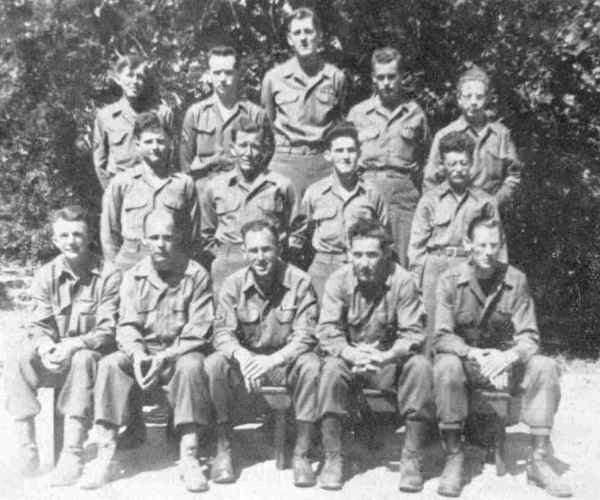Battery Administrative, Mess and Supply Sections

Top row: Tech. 5 Floyd N. Carlson, Tech. 5 Chester V. Greer, Tech. 5 Arthur D. Kimber, Pvt. Howard E. Rollins, Pvt. Benjamin J. Corrie.
Middle row: Tech. 4 William A. Kling, Pvt. Harold Jones, Pvt. Harold J. Atkinson, Pfc. Gordon S. Schuster.
Bottom row: Tech. 5 Andrew Duchon, Jr., Staff Sgt. Randall C. Osteen, 1st. Sgt. Vietor M. Zuzenak, Staff Sgt. James R. Burk, Tech. 4 George B. Sturgis.
From the time the Battery was in its infancy, right up until the present, when after a not long but arduous life it is a hardened and seasoned veteran, these three sections have figured in all of the Battery's accomplishments. They can be likened to stout threads that are woven through the many Sections, binding them together and completing the picture of a smooth, well functioning organization.
Each and every man was, and is important in his own right. They performed deeds that were often taken for granted. On the long drives through Normandy, Brittany, Belgium, Luxembourg, and Germany it got to be an every day occurance for the supply men to travel many, many, miles through country that had not as yet been completely cleared of the enemy, to get rations, supplies, and mail, and then to come back to the unit which never was in the same place they had left it. It was not unusual for these men, who traveled back and forth, night and day, despite enemy bombs and bullets, rain, mud, snow, ice, and impassable roads, to travel through towns that had never been actually "taken." It was their unfailing devotion to duty that kept the Battery moving ever forward with food, clothing gasoline, and ammunition.
To many of the men in the Mess Section goes the credit for having dual roles in the Battery. It was these men, who, at their own request, acted as security guards when they were not performing their primary task of cooking.
And task it was, for when the Battery operated in two echelons so did the Kitchen. All of which meant that one Section was doing the work of two. It was not unusual for the cooks to be called upon to prepare meals in areas under artillery fire, the Rhein-Main Airport, in Germany, being an outstanding example. Many of the men will not forget the delight of feasts of augmented rations, gotten through initiative and the aid of interpreters, being prepared on solitary burners in small shell torn rooms -- an important crew taking an important function right in stride.
The Battery Administrative Section, with its innumerable functions, performed like troupers from the outset. Hardships, adverse conditions, and the like were merely ignored by these men and they carried out their duties as though everything was being done on a peaceful summer's afternoon. Many of their accomplishments will go unheralded, but the Battery cannot forget how they acted as intermediary between officers and men, the superb manner in which they cleaned and made secure billets throughout the long cold winter, their coordination of security guards, their morale building distribution of mail, and their administration to all the aches, pains and what nots, the not to be forgotten records that kept in order, pay coming in and allotments going home. I
All in all, each man has performed his duty in a manner that is a credit to the Battery, his Section, and to himself.
NOTE: Remove question mark from address below when sending email
This page is maintained by Bruce Frederick, .
Last updated: March 2, 2002
